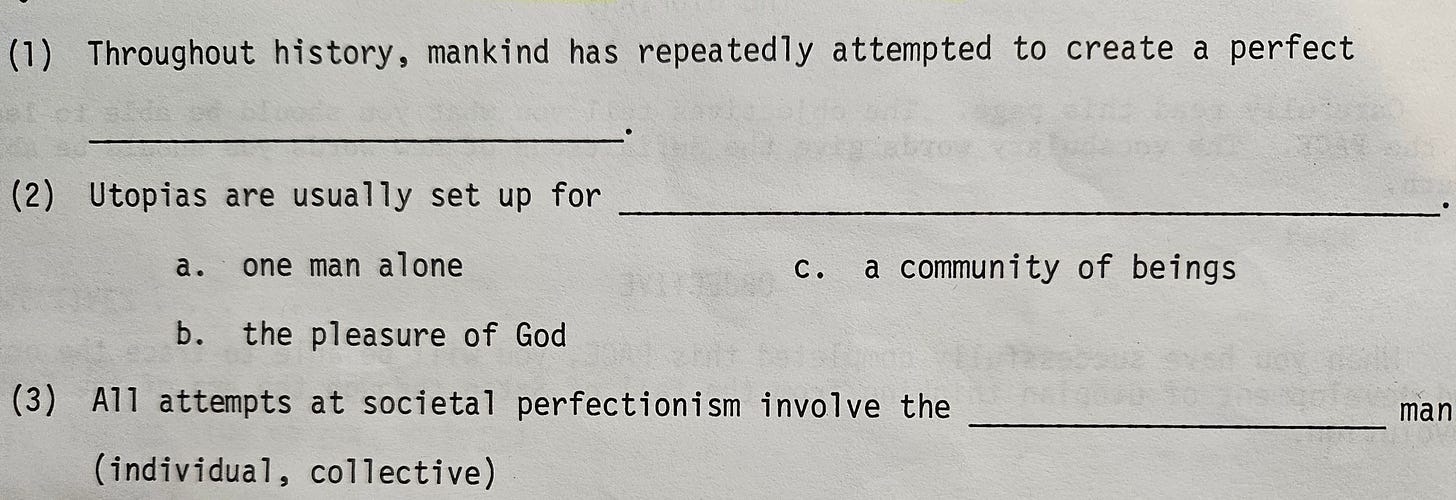This series begins my PACE course review of Basic Government: Collectivism. Below are Exhibits pulled from PACE 133 in chronological order as they appear in each of my posts. Topics include teaching students about:
Demonic Possession
Which angel or demon would win in 1v1 combat
The case against Eve for secretly wanting the Devil to take advantage of her
Satan’s Rebellion, which is taught as the first Communist/Collectivist rebellion in history
Weird Republican talking points to include capital punishment and male superiority
Empirical Errors
Collectivism 133, Part 1
Exhibit 58
Exhibit 59
Exhibit 60
THE FALL OF SATAN
Human dissatisfaction
Throughout human history, mankind has repeatedly attempted to create a perfect society. Every would-be social planner, however, has his own unique conception of what constitutes that perfect society. Equally as strong as the utopian’s unquenchable desire to remake the world is his demand that everyone else be forcibly jammed into his narrow Procrustean mold. Never does a man set up a utopia for himself alone, but for a community of beings. To some degree, therefore, all attempts at societal perfectionism involve the collective man and are examples of collectivism.
Collectivism 133, page 1
Exhibit 61
The failures of utopias
Human governments and social organizations are not in themselves evil. Both kinds of institutions are needed by man and ordained by God.
[…] any human endeavor instigated without the direct agency of God is fallible and ultimately doomed to failure. The only earthly “utopia” to which we may look with complete expectation of success is the government which will be instituted under the direct and personal Millennial reign of the Lord Jesus Christ.
Collectivism 133, page 2
Exhibit 62
When will this happen?
All the evidence points convincingly to a time at or around the year 2000. As already pointed out, a host of Christian organizations and leaders have this year as their target. In addition, all the “signs” (fulfilled prophecies) also point to A.D. 2000.
World Awakening, page 174
Exhibit 63
(1) utopia [or] society
(2) c. a community of beings
(3) collective
Collectivism 133, page 2
Exhibit 64
The problem lies in the fact that in every instance of abortive utopian activity, prideful homo sapiens has defiantly shaken his fist of clay in the face of Almighty God and blasphemously proclaimed, “I will create the perfect world where You have failed.” The reverberating “I will” echoes and re-echoes across the pages of recorded history as an ever-present indictment of humanity’s inherent sin nature. Man’s evil imagining that he, better than God, could direct the functioning of the world, is not original with him. One greater than man, indeed, the highest of created beings, anticipated every attempt of humans to “do their own thing.”
Collectivism 133, page 2
Exhibit 65
The angelic realm
Angels, like the human race, were the specific creation of God; but, unlike men, they neither reproduce nor die. Since their creation, the angels have always been; but there was a time before they were.
[…]
The Bible gives us the names of only three of these angelic beings—Michael, Gabriel, and Lucifer. Michael is specifically referred to as an archangel, and it has been suggested that all three might have been originally given that title and position. It is possible that each of these possible archangels was given charge over one third of the angels of heaven.
Collectivism 133, page 3, 4
Exhibit 66
Lucifer, the son of the morning
Angels were created stronger and wiser than men, but less so than God. The archangels, Michael and Gabriel, probably possess greater power and glory than the average angels. Chief among all the angels, however, was Lucifer—the highest of all created beings. Even now, only the triune God is stronger than Lucifer. Even the archangel Michael fears to challenge him in his own strength (Jude 9).
Collectivism 133, page 4
Exhibit 67
Exhibit 68
The entire core A.C.E. curriculum for all grade levels in all subjects was written by separated Christians with a Biblical philosophy of life with Scriptural content where appropriate, Exposure to sub-Christian values is not considered relevant to a Bible based on education. It has been taught by Bill Gothard that Jesus had 60 ideal character traits. Such similar character principles, as can be taught from the printed page, are built into the curriculum unit at a time, so that a child starting at the first unit of material and advancing all the way to graduation would have studied the principles of 60 character traits 12 times repetitiously applied will reinforce Bible principles into the life with the highest capability.
Rebirth of Our Nation, page 297
Exhibit 69
Lucifer had been created perfect, but iniquity was found in him—the sin of pride. God’s perfect creature sinned. Lucifer had no dark desire to commit any foul and licentious acts of gross immorality. His sin was simply wanting to “do his own thing.” The heavenly society could be greatly improved if only he, Lucifer, replaced God as the sovereign ruler. […] (Isaiah 14:12-15)
Five times the pride-filled Lucifer defiantly told God, “I will”:
“I will ascend to heaven.”
“I will exalt my throne above the stars of God.”
“I will sit also upon the mount of the congregation, in the sides of the north.”
“I will ascend above the heights of the clouds.”
“I will be like the most High.”
Collectivism 133, page 5
Exhibit 70
Lucifer led one third of the angels of Heaven into open revolt against God in an attempt to set up his own “utopia.” Not only did Lucifer sin himself, but he caused another third of the host of God to sin also. Second Peter 2:4 speaks of these “. . . angels that sinned. . .” and Jude 6 tells us about “. . . angels who kept not their first estate. . .” The above quoted Biblical passages record for us the first collectivist revolution against legal authority.
Collectivism 133, page 6
Exhibit 71
At any event, the stage was set for all future rebellions; and Lucifer (now Satan, “the adversary”) would prove to be the ultimate author of them all.
Collectivism 133, page 6
Exhibit 72
Once he had failed in his attempt to overthrow God, Satan never involved himself in any more rebellions. (True or false?) _______
Collectivism 133, page 7
Exhibit 73
Lucifer is the master deceiver. He’s the TIMELESS MIND that dominates men of every age, makes them a slave, groups them together in a system of world control; “principalities, power, rulers of the darkness . . . .” In his kingdom he coordinates the conspiracy to organize lost men, to crush out the gospel ministry, and to resist the propagation of the gospel and theism.
To Save a Nation, page 136
Exhibit 74
Adam himself was given charge, under God, over God’s creation. The Ruler of the Universe delegated authority to His creation. As Lucifer was the highest created being in Heaven, so Adam was the highest created being on earth […]
God was over Adam, and Adam was over all the earth. Adam acted as an intermediary between the Creator and the creation. God was the King, and Adam was the satrap over the subjects of his kingdom. In relation to God, Adam was a vassal; but in relation to God’s creation, Adam was the suzerain. It is because Adam was, before God, the federal representative of our race, that when Adam fell, we fell with him.
Collectivism 133, page 8
Exhibit 75
The “adversary” of God did not launch his attack directly at man, but took advantage of his weaker (1 Peter 3:7) mate. Satan and the serpent did not have to lure Eve to the center of the garden where the forbidden tree grew. She was looking at the tree of the knowledge of good and evil and possibly questioning in her own mind the reasons for God’s prohibition. Half of Satan’s battle Eve had already won for him. She had put herself in the place of temptation.
Collectivism 133, page 9
Exhibit 76
As they conversed, Satan (through the instrument of the serpent) carefully laid a trap for the unwary woman. Satan deliberately omitted the word freely when he asked “. . . hath God said, Ye shall not eat [freely] of every tree in the garden?” When she answered him Eve fell easily into Satan’s snare; and she likewise omitted the word freely; plus, she left out the word surely […]
Satan, realizing he had Eve entangled, pounced upon her omission of the word surely. “And the serpent said unto the woman, Ye shall not surely die.” (emphasis added; Genesis 3:4) Eve further violated God’s Word by not only subtracting from it, but also by adding to it. “. . . God hath said, Ye shall not eat of it, neither shall ye touch it, lest ye die.” (emphasis added; Genesis 3:3)
Collectivism 133, page 10
Exhibit 77
“It is because the quality of language is so high and the culture and linguistic skill of the average American has declined to the point that most young adults cannot read and understand the King James Version of the Bible. It was translated when the English language was at it’s zenith.”
To Save a Nation, page 116
Collectivism 133, Part 3
Exhibit 78
The real ruler of this world
When he sinned, Adam actually transferred his allegiance from God to Satan. Before his fall, Adam was the satrap of his suzerain lord—God. After the fall, Adam became the satrap of his new suzerain lord—Satan. Along with the vassal—Adam—also went the vassal’s dominion—earth. Satan took over control of this earth and has been called “the ruler of this world,” “the prince of this world,” and “the god of this world.” This is no passive overlordship, but real, direct, and personal reigning. The “god of this world” takes an active part in the affairs of this world.
Collectivism 133, page 11, 12
Exhibit 79
Collectivism 133, page 12
Exhibit 80
Collectivism 133, page 13
Exhibit 81
Human government is an absolute necessity because fallen, sinful man needs a moral restraint on his evil and immoral tendencies. […]
In the “Age of Conscience” that followed the fall of mankind, each man was to be he head of his own family. Each family head was the government of that family unit: “unto the woman he [God] said, I will greatly multiply thy sorrow and thy conceptions; in sorrow thou shalt bring forth children; and thy desire shall be to thy husband, and he shall rule over thee.” (emphasis added, Genesis 3:16) At this point in time, each family head could have effected his own utopia, but not one succeeded.
Collectivism 133, page 14
Exhibit 2 [sic]
After the Flood, God instituted human government. In the ninth chapter of the book of Genesis, God instituted capital punishment for the crime of murder:
"And surely the blood of your lives will I require; at the hand of every beast will I require it, and at the hand of man. At the hand of every man's brother will I require the life of man. Whoso sheddeth man's blood, by man shall his blood be shed: for in the image of God made he man." (Genesis 9:5-6)
God authorized human government, in His Name, to have the power of life and death. If a man took the life of another, God demanded that the murderer's life be forfeited to the state. God-ordained government is to act as a restraint on selfishness and to regulate man's societal interactions when it is necessary.
Collectivism 133, Page 15
Exhibit 82
Governments were established to punish wrongdoers and to reward the good. In fact, any society that does not mete out swift justice to lawbreakers will surely destroy itself. […]
(21) God’s commandment, “Thou Shalt Not Kill,” negates capital punishment. (True or false?) _______
(22) Governments are to (a) _______ wrongdoers and (b) __________ the good.
(23) If thou do that which is evil, be ____________; for he beareth not the sword in vain.
Collectivism 133, page 15, 16
Answers are (21) False, (22a) punish (22b) reward, (23) afraid.
Exhibit 83
Collectivism 133, Part 4: All About That Rote, No Recall
Exhibit 89
When Lucifer came to Jesus in the temptation, what did he offer him? He said, “Fall down and worship me and I’ll give you” what? “The kingdoms of this world.” Jesus said, “My kingdom is not of this world.” They were Satan’s to give[…] You’ve heard the song, “He’s Got the Whole World in His Hand;” no, Lucifer has the world in his hand, for “the whole world lieth in wickedness” (I John 5:19b). Lucifer is the god of this world.
Is God real? You say, “The heavens declare the glory of God and the firmament showeth His handiwork.” (Psalm 19:1) Of course, He’s real. Everyone can see the evidence of God. Is Lucifer real? Is Satan real? You can see his footprints across the pages of history. From the beginning Lucifer mastered the fall of man, deceived Eve in the garden of Eden, tempted man with the vain deceitful religion of humanism[…]
He’s just the god of this world “doing his thing.”
To Save a Nation, page 136
Exhibit 90
Collectivism 133, page 25
Exhibit 91
Collectivism 133, page 26
Exhibit 92
In talking to one publisher, he said, “ What you want — full scope and sequence of twelve grades, and continuous progress curriculum in English, math, science and social studies — why, that will take twenty years to develop and cost 20,000,000.” My only remark was, “We must have it next September!”
Rebirth of Our Nation, page 323
Exhibit 93
Again, we do not build Christian schools primarily to give a child the best education nor to teach him how to make a good living. Teaching him how to live and to love and serve God are our primary tasks.
World Awakening, page 214
Exhibit 117
Many of the schools involved in lawsuits over state regulation use a curriculum designed by Accelerated Christian Education in Garland, Tex.
[…]
“They teach history as Biblical history, Biblical science, and so forth,” said one critic who asked not to be named. “It’s very sincere, but just doesn’t equip a child for the world today.”
Asbury Park Press, July 28, 1978, Page 19
Exhibit 94
On July 7 of that year, Sir Thomas More was beheaded.
Collectivism 133, page 28
Correction:
On July
76 of that year, Sir Thomas More was beheaded. [1, 2]
Exhibit 95
Fourier
Francois Marie Charles Fourier (1772-1847) was born at Besancon, France, on April 7, 1772. He was an exceptionally lonely man who was little more than insane.
Collectivism 133, page 36
Correction:
Exhibit 85
The next five years were consumed in an immoral liaison with the Marquise du Châtelet, a woman some years his senior. Upon the demise of Madam du Châtelet, in 1749, Voltaire accepted the longstanding invitation of Fredrick II of Prussia to take up residence in Berlin.
Collectivism 133, page 32
Corrections:
The next
fivefifteen years were consumed in an immoral liaison with the Marquise du Châtelet, a woman some years hisseniorjunior. [1, 2]
Exhibit 96
Early in his youth, Voltaire openly rebelled against his parents, left home, and came under the influence of freethinkers and would-be revolutionaries, thus setting the overall tone for his not altogether savory lifestyle. Voltaire spent most of his life aimlessly darting about Europe, hobnobbing with the various liberals, libertines, and libertarians of his day. Almost everywhere he went, Voltaire managed to get into trouble with authorities and was eventually forced to flee.
Collectivism 133, page 31
Exhibit 97
The rest of his life was a series of financial ups and downs coupled with moral laxity and fits of depression. In 1823, Saint-Simon attempted suicide with a pistol, but only succeeded in putting out one eye. He died in the city of his birth on May 19, 1825.
Collectivism 133, page 35
Exhibit 98
Collectivism 133, page 36
Exhibit 99
The remainder of his life was spent wandering around Europe, often without purpose. For a brief period, Rousseau studied for the Roman Catholic priesthood, but gave it up to become a vagrant once again. In 1741, he settled in Paris and remained there for fifteen years[…]
In 1770 he returned to France under an assumed name.
Collectivism 133, page 33
Corrections:
In
17411742, he settled in Paris and remained there forfifteenfourteen years[…]In
17701767 he returned to France under an assumed name.
Exhibit 100
Teen Turmoil, page 173

















